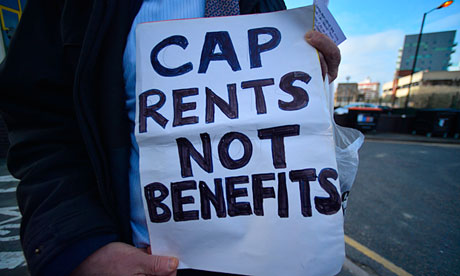Universal credit: the essential guide
The
flagship policy in the government's welfare reform programme is being
piloted from 29 April and is due to go live nationally this October.
Study the issue in depth and learn all you need to know about what happens next with our essential guide

Protesters demand a
cap on rents not benefits in Stratford, London. The overall benefit cap
is part of the governments welfare reforms, along with the bedroom tax,
changes to council tax benefit and universal credit. Photograph:
Gail-Orenstein/Demotix/Corbis
1. What is universal credit?
2. How is the system different?
3. When does it begin? Is it on track?
4. Why is the government pushing for reform?
5. Does the reform tie in with the government's "strivers and scroungers" rhetoric?
6. Whose idea was it?
7. Which benefits does it replace?
8. Which benefits remain?
9. What will claimants be expected to do in return for universal credit?
10. What is all the talk of "digital by default"?
11. Has the development of the universal credit IT system gone smoothly?
12. What are campaigners worried about?
1. What is universal credit?
Universal credit (UC) is the flagship policy in the government's
welfare reform programme (pdf), billed as representing the biggest change to the
welfare system since the 1940s. It is designed to simplify the
benefits system. The government wants the system to "
ensure that work always pays and is seen to pay" and to encourage people to see work as the best route out of
poverty.
The secretary of state for work and pensions,
Iain Duncan Smith,
has promised: "Universal credit will mean that people will be
consistently and transparently better off for each hour they work and
every pound they earn." The current system of means-tested out-of-work
benefits, tax credits and support for housing will be replaced by a
single income-replacement benefit.
The government hopes the reform will:
• Simplify the system.
• Reduce the financial and administrative barriers to taking up work.
• Make it easier for people to understand how much they will gain by taking a job.
• Create greater incentives to take up work.
• Prepare out-of-work claimants for their next job.
• Reduce the amount spent on administration and tracking down fraud and error.
• Reduce (in the longer term) the number of children and adults living in poverty.
• Reduce the number of workless households by always ensuring that work pays.
The changes will affect around 8 million households.
• Back to the top
2. How is the system different?
In
theory, most claimants will apply online and manage their claim through
an online account, making the system cheaper to administer. It will be
available to people who are in work and on a low income as well as to
people who are out of work.
It will merge out-of-work benefits and in-work support
(pdf), so claimants should not feel they are taking a risk as they move
from one system to another. Universal credit is intended to improve
work incentives by ensuring that support is reduced at a consistent rate
as people return to work.
Most claimants on low incomes will
still be paid universal credit when they first start a new job or
increase their part-time hours. Claimants will receive just one monthly
payment, paid into a bank account in the same way as a monthly salary.
Support with housing costs will go direct to the claimant as part of
their monthly payment, rather than to the landlord.
• Back to the top
3. When does it begin? Is it on track?
Universal
credit will go live nationally in October 2013. A pilot programme was
due to begin in Tameside, Oldham, Wigan and Warrington from the end of
April 2013. These pilots were designed to identify where changes needed
to be made to "ensure the new service is robust and reliable when
universal credit goes live nationally in October 2013", the Department
for Work and Pensions (DWP) said.
But in March (in the news dead
zone, on the Thursday evening before Good Friday) the DWP announced that
three of the four pilots (Wigan, Warrington, Oldham) had been postponed
until July, and only the Tameside pilot would happen on schedule in
April (launching Monday 29 April).
Labour said universal credit
was "on the edge of disaster", claiming that IT systems needed for it
were not yet ready. The shadow work and pensions secretary, Liam Byrne,
said: "This is yet another embarrassing setback for universal credit." A
DWP spokesperson said there had been no delay, and that the pilots
rollout needed to be gradual. The government has been deliberately vague
about the precise timetable for rollout, allowing it to deny that there
have been any delays.
The broad timetable states that universal
credit will start to take new claims from unemployed people in October
2013. For people in work this process will begin in April 2014. The
remainder of current claims will be moved to universal credit from 2014,
with the process being complete by 2017.
• Back to the top
4. Why is the government pushing for reform?
The
chancellor, George Osborne, said in his keynote speech on welfare
reform in April: "The benefit system is broken; it penalises those who
try to do the right thing; and the
British people badly want it fixed.
We agree – and those who don't are on the wrong side of the British
public." He pointed to the development of universal credit as part of
the answer.
Under the current benefits system, the financial gains of
taking a job can be very small. Many workers have most of any increase
in earning deducted from their benefits and tax credits payment, with
some households facing deduction rates as high as 91%, the DWP says.
"This
problem is compounded by the administrative complexity of the system.
There are separate systems for out-of-work and in-work support delivered
by different parts of government. A move into work therefore entails a
recalculation of entitlement, multiple communications and possible
delays and gaps in payment. As a result, many people are not prepared to
take the risk of moving into work," the DWP says.
"In around 1.1
million households, a person would currently lose between 70% and all of
their earnings if they move into work of 10 hours a week. The
incentives to increase hours once in work are also very weak. Under the
current system around 700,000 individuals in low-paid work would lose
more than 80% of an increase in their earnings because of higher tax or
withdrawn benefits.
"The current system of benefits provides
targeted support to meet specific needs, but the net effect is a complex
array of benefits which interact in complicated ways, creating perverse
incentives and penalties, confusion and administrative cost. This has
the effect of preventing many in our society from seeing work as the
best route out of poverty. It also increases the risk of error and the
opportunities for fraud."
The UC system introduces higher earnings
disregards, a 65% taper rate, and more "conditionality" (introducing
new responsibilities, such as mandated work placements, for claimants).
There are new sanctions for those who do not comply with the
regulations.
The DWP promises that UC will improve work incentives in three ways:
•
Ensuring that support is reduced at a consistent and predictable rate,
and that people generally keep a higher proportion of their earnings.
• Ensuring that any work pays and, in particular, low-hours work.
•
Reducing the complexity of the system, and removing the distinction
between in-work and out-of-work support, thus making clear the potential
gains to work and reducing the risks associated with moves into
employment.
• Back to the top
5. Does the reform tie in with the government's "skivers and strivers" rhetoric?
In the
universal credit white paper
(pdf), the government argues: "Welfare dependency has become a
significant problem in Britain with a huge social and economic cost."
The new benefit will be "leaner" and "firmer".
"The UK has one of
the highest rates of children growing up in homes where no one works and
this pattern repeats itself through the generations. Less than 60% of
lone parents in the UK are in employment, compared to 70% or more in
France, Germany and the Netherlands … Universal credit will start to
change this. It will reintroduce the culture of work in households where
it may have been absent for generations," the white paper argues.
In December, the Joseph Rowntree Foundation published a
study dismissing this notion of a "culture of worklessness".
Link to video: Skivers v strivers: the benefits debate explained | Animation
• Back to the top
6. Whose idea was it?
All
parties have talked about the need to reform the complex benefit
system, but the concept of universal credit came directly out of work
done by the Centre for Social Justice (CSJ), the thinktank launched by
Iain Duncan Smith while in opposition in 2004.
"Too much of our
current system is geared toward maintaining people on benefits rather
than helping them to flourish in work; we need reform that tackles the
underlying problem of welfare dependency," he said.
The CSJ
produced a report in 2009 called Dynamic Benefits: towards welfare that
works, which stated: "Work must be supported as the principal route out
of poverty. We propose replacing the current confusing array of benefits
with a 'Universal Credit' – a simpler, more cost-effective system that
provides greater rewards for work."
It proposed a new system to
taper the withdrawal of benefits so that claimants no longer faced a
"cliff-edge withdrawal" when they go into work.
The new coalition government made UC the key element in its welfare reform programme in 2010.
• Back to the top
7. Which benefits does it replace?
The benefit replaces six income-related work-based benefits:
• Working tax credit.
• Child tax credit.
• Housing benefit.
• Income-related employment and support allowance (ESA).
• Income-based jobseeker's allowance (JSA).
• Income support.
• Back to the top
8. Which benefits remain?
Critics point out that
universal credit is not entirely universal, given that it does not embrace all benefits into one simplified system. A large number of benefits remain, including:
• Contribution-based JSA.
• Contributory ESA (limited to 52 weeks for those in the work-related activity group).
• Attendance allowance (AA) and disability living allowance (DLA) for children.
• Carer's allowance.
• Bereavement benefits.
• Industrial injuries disablement benefit and war pensions.
• Maternity allowance; statutory sick/maternity/paternity/adoption pay (these will be treated as earnings for UC).
• Child benefit and guardian's allowance.
•
Pension credit (PC) – unlike now, both partners in a couple will need
to be over the prescribed age to get PC, which will also include
allowances for children and rent, although in the short-term it appears
claimants over PC age will be able to claim tax credits and housing
benefit.
• Social fund maternity, funeral, winter fuel and cold weather payments.
•
"Passported" benefits: additional benefits (such as free school meals
or free prescriptions) to which claimants on certain other benefits
and/or tax credits are automatically entitled.
• Back to the top
9. What will claimants be expected to do in return for universal credit?
According
to the DWP: "At the heart of universal credit is a partnership between
the state and the claimant. In return for receiving financial support,
out of work claimants, depending on their circumstances, must look for
work, or take steps towards it. This may include preparing a CV,
attending training courses, applying for suggested vacancies or
registering with a recruitment agency.
"In most cases they must
also be available and willing to immediately take up work and attend
periodic interviews to discuss plans and opportunities for returning to
work (immediately or in the future)."
• Back to the top
10. What is all the talk of "digital by default"?
In
theory, the introduction of universal credit coincides with a move to
online claims, but there is much uncertainty about whether the necessary
computer system will be ready in time.
The idea is that claims
will be made online, and all subsequent contact between the DWP and
claimants is meant to be conducted online. The only exception will be
where the DWP authorises a telephone claim.
The government
promises: "We want to make the process of claiming universal credit as
simple as possible for claimants. Universal credit is being designed so
that each claimant can make a claim online and then personally manage
their claim directly through an online account.
"Wherever
possible, we want claimants to notify us via their online account of any
relevant information and changes of circumstance as soon as possible
after the change occurs."
For those people who are working, UC
will be calculated automatically, adjusting credit payments according to
monthly income reported through an upgraded version of the pay as you
earn (PAYE) system.
The government accepts that a "minority" of
claimants won't have access to a computer with internet, or won't be
able to claim online. Campaigners are anxious that the government has
been over-optimistic about the number of people who are able to go
online to claim.
The government is promising "digital champions"
in every jobcentre "to help staff support and encourage claimants to
take their first steps online and see the benefits of being able to use
the internet".
There is industry speculation about whether a
computer system capable of handling all the online claims will be ready
in time for the launch.
• Back to the top
11. Has the development of the universal credit IT system gone smoothly?
The
DWP has repeatedly claimed that the development is on schedule and on
budget. Reports from within the IT industry have repeatedly indicated
that this is not the case.
The white paper promised that UC "would
involve an IT development of moderate scale, which the Department for
Work and Pensions and its suppliers are confident of handling within
budget and timescale".
Labour has claimed that work on the £500m
IT delivery contract has hit serious problems, and has pointed to the
departures of several key figures overseeing the development of the
computer program.
Computer Weekly notes that there have been four
people heading up the project in just six months, and reveals that there
will be a new head – Howard Shiplee – from mid-May. "The changes in
leadership succession have led to further speculation that the project
has hit problems, with reports that the IT behind the project is not
ready. However, the department insists that universal credit will be
delivered on time and within budget," it reports.
Campaigners are uneasy about the capacity of the government's IT systems to deliver. The
Child Poverty
Action Group warns: "Predominantly IT-based administration represents a
big risk, given the poor record of large-scale government IT projects.
The assumption that the vast majority of claimants can initiate and
manage their claims online seems unrealistic and may cause difficulties
for many claimants. Administration by a single agency could reduce
bureaucracy and duplication, but may not necessarily result in a better
service."
• Back to the top
12. What are campaigners worried about?
•
Monthly payments
The
government thinks this will help promote good budgeting and more
closely replicate monthly salary payments – arguing that 75% of all
employees receive wages monthly. "This will help smooth the transition
into monthly paid work, encourage claimants to take personal
responsibility for their finances and to budget on a monthly basis which
could save households money. For example, monthly direct debits for
household bills are often cheaper than more frequent billing options,"
the government argues. Campaigners are worried that the shift from
weekly and fortnightly payments to this new regime may push claimants
recipients into debt. The Social Market Foundation says: "Most
households in our sample opposed the idea of a monthly payment. This was
the case for the majority of households, who tended to budget on a
daily, weekly or fortnightly cycle."
•
Direct payments
The
prospect of stopping housing benefit payments to landlords and directly
paying the claimant is causing a lot of unease. The National Housing
Federation says the shift from paying landlords to paying claimants
direct for the housing benefit element could trigger unprecedented
levels of arrears and increased rent collection costs. "Of all the
reforms, the introduction of direct payments to tenants is expected to
have the biggest impact – more than 80% of housing associations say it
will affect their organisations a great deal or a fair amount," an NHF
report warns. "84% of associations believe that rent arrears will
increase as a direct result of welfare changes. The average increase
expected is 51%, which, if replicated across the sector, would mean an
additional £245m of arrears."
The government has said that
"vulnerable" tenants may be excluded
(pdf) and has devised an "automatic switchback mechanism" – paying rent
to the landlord when a tenant's arrears hit a threshold level – but
there are currently very few details of what constitutes a vulnerable
tenant.
There are concerns that more people could be evicted as a
result. The BBC obtained figures that showed when the direct payments
were piloted in six areas of the country there was a big rise in rent
arrears as some tenants failed to pass that money on, with arrears
rising from about 2% to 11%.
•
Conditionality and sanctions
"Entitlement
to UC is subject to a strict regime of 'personalised' conditionality
(ie mandatory activity to prepare for and obtain work), backed by tough
benefit sanctions (ie loss of benefit) for non-compliance," the
government says.
The Child Poverty Action Group warns: "The need
for more conditionality comes across as a 'moral crusade', rather than
being evidence based … There are concerns that some vulnerable claimants
could face repeated sanctions for failing to comply with the demands of
the system and that personal advisers and the Work Programme (within a
culture of 'payment by results') will have too much power and discretion
to impose unreasonable requirements on claimants."
The charity
warns in a UC training document: "Sanctions, in the form of loss of
benefit, are designed to incentivise claimants to meet their
work-related requirements and punish them for unreasonable failures. The
regime is harsh, and there is concern that some claimants who
repeatedly fail to comply with the system could be sanctioned and forced
to survive on below subsistence income for long periods. This could
include vulnerable claimants with mental health or social functioning
problems, who find it difficult to comply with directions."
A high
level sanction can be imposed if, for example, a claimant fails for no
good reason to take up an offer of paid work. The higher level sanction
is the loss of the standard allowance of 91 days for a first failure,
182 days for a second higher level sanction within a year, and 1,095
days (three years) for another failure within a further year
(disregarding "pre-claim" failures).
Hardship payments will be
available of 60% of the sanctioned amount for those who cannot meet
their "immediate and most basic and essential needs for accommodation,
heating, food and hygiene".
•
Lone parents could lose out
The
Institute for Fiscal Students (IFS) calculates that "because of the way
the parameters of universal credit have been chosen, couples, and
particularly those with children, look set to gain by more, on average,
than single-adult families, particularly lone parents, who will lose on
average according to our analysis".
You can Follow Ray and People Before Profit campaigns on Twitter;@Raywoolford

 Mystery
abounds about what is happening with the Elephant & Castle ; Castle shopping
centre. An article purporting to give the latest information on
Mystery
abounds about what is happening with the Elephant & Castle ; Castle shopping
centre. An article purporting to give the latest information on  Deputy
Mayor for Transport Isabel Dedring, also appears to have a different
idea for the shopping centre if the reference to its demolition is
accurate. St. Modwen favour refurbishment and redevelopment of the
existing structure. The uncertaintly surrounding the remodelling of the
northern roundabout and the northern line upgrade are also big factors. A
feasibility study of the roundabout’s peninsularisation is due to
appear this month. Agreement is still pending for the funding of the
northern line tube station capacity upgrade.
Deputy
Mayor for Transport Isabel Dedring, also appears to have a different
idea for the shopping centre if the reference to its demolition is
accurate. St. Modwen favour refurbishment and redevelopment of the
existing structure. The uncertaintly surrounding the remodelling of the
northern roundabout and the northern line upgrade are also big factors. A
feasibility study of the roundabout’s peninsularisation is due to
appear this month. Agreement is still pending for the funding of the
northern line tube station capacity upgrade.


